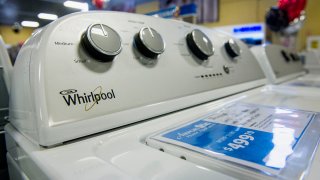
- Demand for home goods and appliances is on the rise and the trend won't go away anytime soon, according to Whirlpool CEO Mark Bitzer.
- Whirlpool shares rose after the company posted better-than-expected earnings and raised its forecast for the year.
- Higher raw material and freight costs have prompted Whirlpool to boost prices as much as 12%.
Demand for home goods and appliances is on the rise and the trend won't go away anytime soon, according to Whirlpool CEO Mark Bitzer.
"People have a strong orientation to the house and the home," Bitzer told CNBC's "Closing Bell" in an interview Wednesday. "If you listen to all the companies announcing their work policies, I would say many consumers will stay on average one or two days more at home. That just drives appliance consumption and that will not go away anytime soon."
Get Philly local news, weather forecasts, sports and entertainment stories to your inbox. Sign up for NBC Philadelphia newsletters.
Earlier Wednesday, Whirlpool announced it earned $433 million, or $6.81 per share, up sharply from earnings of $154, or $2.45 a share, a year ago. Excluding items, Whirlpool earned $7.20 a share.
Sales rose nearly 24% to $5.36 billion from $4.33 billion a year ago.
The company also raised its forecast for the year. It now expects sales to rise 13%, more than double its prior estimate of 6% sales growth. Earnings per share are expected to be between $23.10 and $24.10.
Money Report
Shares rose more than 2% in trading after the market closed on Wednesday.
Bitzer said sales of its products will be further helped by the increased demand in the housing market, which will fuel the industry's growth for years to come. In the short term, he said, Covid stimulus checks are helping to drive consumer spending.
Recent cost inflation for raw materials such as steel, plastics and oil and freight has forced the company to raise prices, but that hasn't deterred Bitzer's optimism.
"Obviously, we're facing an environment where we just see cost inflation. I don't think that cost inflation will go away overnight," he said. "We saw a need to come up with price increases and ... implemented price increases in the range of 5% to 12%."






